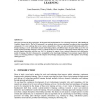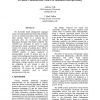3185 search results - page 300 / 637 » Principles for modeling language design |
TACS
1997
Springer
13 years 12 months ago
1997
Springer
Abstract. Flexibility of programming and efficiency of program execution are two important features of a programming language. Unfortunately, however, there is an inherent conflict...
DAC
2006
ACM
14 years 9 months ago
2006
ACM
Ever-growing complexity is forcing design to move above RTL. For example, golden functional models are being written as clearly as possible in software and not optimized or intend...
IADIS
2004
13 years 9 months ago
2004
This paper presents the design principles, development and implementation of an e-learning framework, called Intelligent Cognitive Agents (InCA). The InCA framework is an ontology...
DSRT
2005
IEEE
14 years 1 months ago
2005
IEEE
The Extensible Battle Management Language project has implemented XML based data mediation services to translate from legacy XML schemas into XML schemas, based on a common tag se...
WWW
2006
ACM
14 years 9 months ago
2006
ACM
Path expressions are the principal means of locating data in a hierarchical model. But path expressions are brittle because they often depend on the structure of data and break if...


